Taxonomy of Anopheles
Anopheles is a genus of mosquitoes (Culicidae). Of about 484 recognised species, over 100 can transmit human malaria, but only 30–40 commonly transmit parasites of the genus Plasmodium that cause malaria, which affects humans in endemic areas. Anopheles gambiae is one of the best known, because of its predominant role in the transmission of the deadly species Plasmodium falciparum.
| Anopheles | |
|---|---|
 | |
| Anopheles stephensi | |
| Scientific classification | |
| Kingdom: | |
| Phylum: | |
| Class: | |
| Order: | |
| Superfamily: | |
| Family: | |
| Subfamily: | |
| Genus: | |
| Subgenera | |
| |
Classification
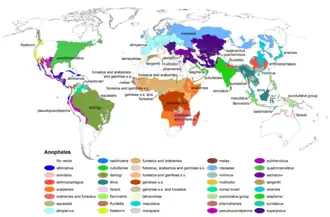
The classification of this genus began in 1901 with Frederick Vincent Theobald.[1] Despite the passage of time, the taxonomy remains incompletely settled.[2][3][4] Classification into species is based on morphological characteristics - wing spots, head anatomy, larval and pupal anatomy, and chromosome structure, and more recently on DNA sequences.[5][6][7][8]
The genus Anopheles belongs to a subfamily Anophelinae with three genera: Anopheles Meigen (nearly worldwide distribution), Bironella Theobald (Australia only: 11 described species) and Chagasia Cruz (Neotropics: four described species). The genus Bironella has been divided into three subgenera: Bironella Theobald (two species), Brugella Edwards (three species) and Neobironella Tenorio (three species). Bironella appears to be the sister taxon to the Anopheles, with Chagasia forming the outgroup in this subfamily.
The type species of the genus is Anopheles maculipennis.[9]
Subgenera
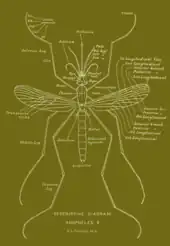
The genus has been subdivided into seven subgenera based primarily on the number and positions of specialized setae on the gonocoxites of the male genitalia. The system of subgenera originated with the work of Christophers, who in 1915 described three subgenera: Anopheles (widely distributed), Myzomyia (later renamed Cellia) (Old World) and Nyssorhynchus (Neotropical). Nyssorhynchus was first described as Lavernia by Theobald. Frederick Wallace Edwards in 1932 added the subgenus Stethomyia (Neotropical distribution). Kerteszia was also described by Edwards in 1932, but then was recognised as a subgrouping of Nyssorhynchus. It was elevated to subgenus status by Komp in 1937; this subgenus is also found in the Neotropics. Two additional subgenera have since been recognised: Baimaia (Southeast Asia only) by Harbach et al. in 2005 and Lophopodomyia (Neotropical) by Antunes in 1937.
One species within each subgenus has been identified as the type species of that particular subgenus:
- Subgenus Anopheles - Anopheles maculipennis Meigen 1918[9]
- Subgenus Baimaia - Anopheles kyondawensis Abraham 1947[10]
- Subgenus Cellia - Anopheles pharoensis Giles 1899
- Subgenus Kerteszia - Anopheles boliviensis Theobald 1905
- Subgenus Lophopodomyia - Anopheles squamifemur Antunes 1937
- Subgenus Nyssorhynchus - Anopheles argyritarsis Robineau-Desvoidy 1827
- Subgenus Stethomyia - Anopheles nimbus Theobald 1902[11]
Within the genus Anopheles are two main groupings, one formed by the Cellia and Anopheles subgenera and a second by Kerteszia, Lophopodomyia, and Nyssorhynchus. Subgenus Stethomyia is an outlier with respect to these two taxa. Within the second group, Kerteszia and Nyssorhynchus appear to be sister taxa. Cellia appears to be more closely related to the Kerteszia-Lophopodomyia-Nyssorhynchus group than to Anopheles or Stethomyia, tentatively suggesting the following branching order: ( Stethomyia ( Anopheles ( Cellia ( Lophopodomyia ( Kerteszia, Nyssorhynchus))))).
The number of species currently recognised within the subgenera is given here in parentheses: Anopheles (206 species), Baimaia (one), Cellia (239), Kerteszia (12), Lophopodomyia (six), Nyssorhynchus (34) and Stethomyia (five).
The subgenus Baimaia may be elevated to genus level, as it appears to be a sister group to Bironella and all other Anopheles.[12]
The ancestors of Drosophila and Anopheles diverged 260 million years ago. The Old and New World Anopheles species subsequently diverged between 80 and 95 million years ago.[13][14]
Divisions below subgenus
Taxonomic units between subgenus and species are not currently recognised as official zoological names. In practice, a number of taxonomic levels have been introduced. The larger subgenera (Anopheles, Cellia, and Nyssorhynchus) have been subdivided into sections and series, which in turn have been divided into groups and subgroups. Below subgroup but above species level is the species complex. Taxonomic levels above species complex can be distinguished on morphological grounds. Species within a species complex are either morphologically identical or extremely similar and can only be reliably separated by microscopic examination of the chromosomes or DNA sequencing. The classification continues to be revised.
The first species complex was described in 1926 when the problem of nontransmission of malaria by Anopheles gambiae was solved by Falleroni, who recognised that An. gambiae was a complex of six species, of which only four could transmit malaria. This complex has subsequently been revised to a total of seven species of which five transmit malaria.
Subgenus Nyssorhynchus has been divided in three sections: Albimanus (19 species), Argyritarsis (11 species) and Myzorhynchella (four species). The Argyritarsis section has been subdivided into Albitarsis and Argyritarsis groups.
The Anopheles group was divided by Edwards into four series: Anopheles (worldwide), Myzorhynchus (Palearctic, Oriental, Australasian and Afrotropical), Cycloleppteron (Neotropical) and Lophoscelomyia (Oriental); and two groups, Arribalzagia (Neotropical) and Christya (Afrotropical). Reid and Knight (1961) modified this classification by subdividing the subgenus Anopheles into two sections, Angusticorn and Laticorn and six series. The division was based on the shape of their pupal trumpets. The Laticorn section was created for those species with wide, funnel-shaped trumpets having the longest axis transverse to the stem, and the Angusticorn section for species with semitubular trumpets having the longest axis vertical more or less in line with the stem. The earlier Arribalzagia and Christya groups were considered to be series. The Angusticorn section includes members of the Anopheles, Cycloleppteron, and Lophoscelomyia series, and the Laticorn section includes the Arribalzagia (24 species), Christya, and Myzorhynchus series.
Cellia is the largest subgenus: all species within this subgenus are found in the Old World. It has been divided into six series - Cellia (eight species), Myzomyia (69 species), Neocellia (33 species), Neomyzomyia (99 species), Paramyzomyia (six species) and Pyretophorus (22 species). This classification was developed by Grjebine (in 1966), Reid (in 1968), and Gillies & de Meillon (also in 1968)[15] based on the work by Edwards in 1932. Series definition within this subgenus is based on the cibarial armature - a collection of specialized spicules borne ventrally at the posterior margin of the cibarium - which was first used as a taxonomic method by Christophers in 1933.
Kerteszia is a small subgenus found in South America whose larvae have specific ecological requirements; these can only develop within water that accumulates at the base of the follicular axis of the epiphytic Bromeliaceae. Unlike the majority of mosquitoes, species in this subgenus are active during the day.
Within a number of species, separate subspecies have been identified. The diagnostic criteria and characteristic features of each subgenus are discussed on the own page.
Species complexes
Anopheles nuneztovari is a species complex with at least one occurring in Colombia and Venezuela and another occurring in the Amazon Basin.[16] These clades appear to have diverged and expanded in the Pleistocene.
Medical and veterinary importance
The first demonstration that mosquitoes could act as vectors of disease was by Patrick Manson, a British physician working in China, who showed that a Culex species could transmit filariasis in 1878. This was then followed in 1897 by Ronald Ross, who showed avian malaria could also be transmitted by a species of Culex. Grassi in Italy showed that the species causing human malaria were transmitted by species of the genus Anopheles in 1898. Anopheles gambiae (then Anopheles coastalis), the most important of the vectors transmitting human malaria, was first recognised as such in 1899 at Freetown, Sierra Leone.[17] It was later realised that only a small number of species of mosquitoes were responsible for the vast majority of human malaria and other diseases. This generated a considerable interest in the taxonomy of this and other mosquito genera.
The species of the subgenera Baimaia, Lophopodomyia, and Stethomyia are not of medical importance.
All species within the subgenus Anopheles known to carry human malaria lie within either the Myzorhynchus or the Anopheles series. Anopheles maculipennis s.l. is a known vector of West Nile virus.
Six species in the subgenus Kerteszia can carry human malaria. Of these, only An. bellator and An. cruzii are of importance. Anopheles bellator can also transmit Wuchereria bancrofti.
Several species of the subgenus Nyssorhynchus are of medical importance.
All series of the subgenus Cellia contain vectors of malarial protozoa and microfilariae.
Five species of anopheline mosquitoes (An. arabiensis, An. funestus, An. gambiae, An. moucheti, An. nili) all belonging to the subgenus Cellia are responsible for over 95% of total malaria transmission for Plasmodium falciparum in continental sub-Saharan Africa.
Anopheles sundaicus and An. subpictus are important vectors of Plasmodium vivax.
Species evolution
The Anopheles gambiae complex has a number of important malaria vectors. A chromosomal study suggests that An. merus is the basal member of this complex and is sister species to An. gambiae.[18] The two species An. quadriannulatus A and An. quadriannulatus B - neither of whom are vectors for malaria - are derived from An. gambiae.
The subgenera Anopheles and Cellia appear to be sister clades as do Kerteszia and Nyssorhynchus.[19]
Species listing
Species that have been shown to be vectors of human malaria are marked with a star (*) after the name.
Subgenus Anopheles
- Anopheles anthropophagus Xu & Feng 1975
- Anopheles confusa[20]
- Anopheles derooki Soesilo & Van Slooten 1931
- Anopheles gracilis Theobald 1905
- Anopheles hollandi Taylor 1934
- Anopheles obscura Tenorio 1975
- Anopheles papuae Swellengrebel & Swellengrebel de Graaf 1919
- Anopheles simmondsi Tenorio 1977
- Anopheles travestita Brug 1928
- Section Angusticorn
- Complex Claviger (Coluzzi et al. 1965)
- Anopheles claviger* Meigen 1804
- Anopheles petragnani Del Vecchio 1939
- Complex Claviger (Coluzzi et al. 1965)
- Group Aitkenii (Reid & Knight, 1961)
- Anopheles aberrans Harrison & Scanlon 1975
- Anopheles acaci Baisas 1946
- Anopheles aitkenii James 1903
- Anopheles bengalensis Puri 1930
- Anopheles borneensis McArthur 1949
- Anopheles fragilis Theobald 1903
- Anopheles insulaeflorum Swellengrebel & Swellengrebel de Graaf 1919
- Anopheles palmatus Rodenwaldt 1926
- Anopheles peytoni Kulasekera Harrison & Amerasinghe 1989
- Anopheles pilinotum Harrison & Scanlon 1974
- Anopheles pinjaurensis Barraud 1932
- Anopheles stricklandi Reid 1965
- Anopheles tigertti Scanlon & Peyton 1967
- Group Aitkenii (Reid & Knight, 1961)
- Group Alongensis (Phan et al. 1991)
- Anopheles alongensis Evenhuis 1940
- Anopheles cucphuongensis Phan, Manh, Hinh & Vien 1991
- Group Alongensis (Phan et al. 1991)
- Group Atratipes (Lee et al. 1987)
- Anopheles atratipes Skuse 1889
- Anopheles tasmaniensis Dobrowtorsky 1966
- Group Atratipes (Lee et al. 1987)
- Group Culiciformis (Reid & Knight 1961)
- Anopheles culiciformis Cogill 1903
- Anopheles sintoni Puri 1929
- Anopheles sintonoides Ho 1938
- Group Culiciformis (Reid & Knight 1961)
- Group Lindesayi (Reid & Knight 1961)
- Anopheles mengalengensis Ma 1981
- Anopheles nilgiricus Christophers 1924
- Anopheles wellingtonianus Alcock 1912
- Group Lindesayi (Reid & Knight 1961)
- Complex Gigas (Harrison et al. 1991)
- Anopheles baileyi Edwards 1923
- Anopheles gigas Giles 1901
- subspecies crockeri Colless
- subspecies danaubento Mochtar & Walandouw
- subspecies formosus Ludlow
- subspecies gigas Giles
- subspecies oedjalikalah Nainggolan
- subspecies pantjarbatu Waktoedi
- subspecies refutans Alcock
- subspecies simlensis James
- subspecies sumatrana Swellengrebel & Rodenwaldt
- Complex Gigas (Harrison et al. 1991)
- Complex Lindesayi (Harrison et al. 1991)
- Anopheles lindesayi Giles 1900
- subspecies benguetensis King
- subspecies cameronensis Edwards
- subspecies japonicus Yamada
- subspecies lindesayi Giles
- subspecies pleccau Koidzumi
- Anopheles lindesayi Giles 1900
- Complex Lindesayi (Harrison et al. 1991)
- Group Maculipennis (Reid & Knight 1961)
- Anopheles atropos Dyar & Knab 1906
- Group Maculipennis (Reid & Knight 1961)
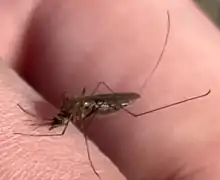
- Anopheles aztecus Hoffmann 1935
- Anopheles lewisi Ludlow 1920
- Anopheles walkeri[1]
- Complex Quadrimaculatus (Linton 2004)
- Anopheles diluvialis Reinert 1997
- Anopheles inundatus Reinert 1997
- Anopheles maverlius Reinert 1997
- Anopheles smaragdinus Reinert 1997
- Anopheles quadrimaculatus* Say 1824
- Complex Quadrimaculatus (Linton 2004)
- Subgroup Freeborni (Linton 2004)
- Anopheles earlei Vargas 1943
- Anopheles freeborni* Aitken 1939
- Anopheles hermsi Barr & Guptavanij 1989
- Subgroup Maculipennis (Linton 2004)
- Anopheles artemievi Gordeyev, Zvantsov, Goryacheva, Shaikevich & Yezhov
- Anopheles atroparvus* Van Thiel 1927
- Anopheles beklemishevi Stegnii & Kabanova 1976
- Subgroup Freeborni (Linton 2004)
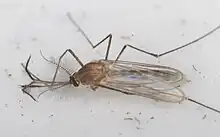
- Anopheles daciae Linton, Nicolescu & Harbach 2004
- Anopheles labranchiae* Falleroni 1926
- Anopheles maculipennis[9]
- Anopheles martinius Shingarev 1926
- Anopheles melanoon* Hackett 1934
- Anopheles messeae* Falleroni 1926
- Anopheles occidentalis Dyar & Knab 1906
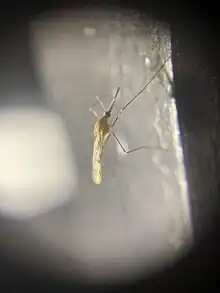
- Anopheles persiensis Linton, Sedaghat & Harbach 2003
- Anopheles sacharovi* Favre 1903
- Anopheles sicaulti Roubaud 1935
- Anopheles subalpinus Hackett & Lewis 1935
- Group Plumbeus (Reid & Knight 1961)
- Anopheles arboricola Zavortink 1970
- Anopheles barberi Coquillett 1903
- Anopheles barianensis James 1911
- Anopheles fausti Vargas 1943
- Anopheles judithae Zavortink 1969
- Anopheles omorii Sakakibara 1959
- Anopheles plumbeus* Stegnii & Kabanova 1828
- Anopheles powderi Zavortink 1970
- Anopheles xelajuensis De Leon 1938
- Group Plumbeus (Reid & Knight 1961)
- Group Pseudopunctipennis (Reid & Knight 1961)
- Anopheles chiriquiensis Komp 1936
- Anopheles franciscanus McCracken 1904
- Anopheles hectoris Giaquinto-Mira 1931
- Anopheles tibiamaculatus Neiva 1906
- Anopheles eiseni Coquillett 1902
- subspecies eiseni Coquillett
- subspecies geometricus Corrêa
- Anopheles parapunctipennis* Martini 1932
- subspecies guatemalensis de Leon
- subspecies parapunctipennis Martini
- Anopheles pseudopunctipennis[1]
- Group Pseudopunctipennis (Reid & Knight 1961)
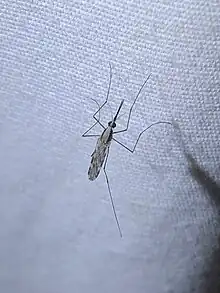
- subspecies levicastilloi Levi-Castillo
- subspecies neghmei Mann
- subspecies noei Mann
- subspecies patersoni Alvarado & Heredia
- subspecies pseudopunctipennis Theobald
- subspecies rivadeneirai Levi-Castillo
- Group Punctipennis (Reid & Knight 1961)
- Anopheles perplexens Ludlow 1907
- Group Punctipennis (Reid & Knight 1961)
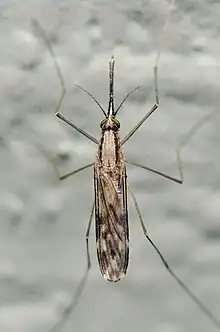
- Anopheles punctipennis Say 1823
- Complex Crucians (Wilkerson et al. 2004)
- Anopheles bradleyi King 1939
- Anopheles crucians Wiedemann 1828
- Anopheles georgianus King 1939
- Complex Crucians (Wilkerson et al. 2004)
- Group Stigmaticus (Reid & Knight 1961)
- Anopheles colledgei Marks 1956
- Anopheles corethroides Theobald 1907
- Anopheles papuensis Dobrowtorsky 1957
- Anopheles powelli Lee 1944
- Anopheles pseudostigmaticus Dobrowtorsky 1957
- Anopheles stigmaticus Skuse 1889
- Group Stigmaticus (Reid & Knight 1961)
- Series Cycloleppteron (Edwards 1932)
- Anopheles annulipalpis Lynch 1878
- Anopheles grabhamii[1]
- Series Cycloleppteron (Edwards 1932)
- Series Lophoscelomyia (Edwards 1932)
- Anopheles bulkleyi Causey 1937
- Series Lophoscelomyia (Edwards 1932)
- Group Asiaticus (Reid 1968)
- Anopheles annandalei Prashad 1918
- Anopheles noniae Reid 1963
- Group Asiaticus (Reid 1968)
- Subgroup Asiaticus (Rattanarithikul et al. 2004)
- Anopheles asiaticus Leicester 1903
- Subgroup Asiaticus (Rattanarithikul et al. 2004)
- Subgroup Interruptus (Rattanarithikul et al. 2004)
- Anopheles interruptus Puri 1929
- Subgroup Interruptus (Rattanarithikul et al. 2004)
- Section Laticorn (Reid & Knight 1961)
- Series Arribalzagia (Root 1922)
- Anopheles anchietai Correa & Ramalho 1968
- Anopheles apicimacula Dyar & Knab 1906
- Anopheles bustamentei Galvao 1955
- Anopheles calderoni Wilkerson 1991
- Anopheles costai Da Fonseca & Da Silva Ramos 1939
- Anopheles evandroi Da Costa Lima 1937
- Anopheles fluminensis Root 1927
- Anopheles forattinii Wilkerson 1999
- Anopheles gabaldoni Vargas 1941
- Anopheles guarao Anduze & Capdevielle 1949
- Anopheles intermedius* Peryassu 1908
- Anopheles maculipes Theobald 1903
- Anopheles malefactor Dyar & Knab 1907
- Anopheles mattogrossensis Lutz & Neiva 1911
- Anopheles mediopunctatus Lutz 1903
- Anopheles minor Da Costa Lima 1929
- Anopheles neomaculipalpis Curry 1931
- Anopheles peryassui Dyar & Knab 1908
- Anopheles pseudomaculipes Peryassu 1908
- Anopheles punctimacula Dyar & Knab 1906
- Anopheles mediopunctatus Lutz 1903
- Anopheles rachoui Galvao 1952
- Anopheles shannoni Davis 1931
- Anopheles veruslanei Vargas 1979
- Anopheles vestitipennis Dyar & Knab 1906
- Series Arribalzagia (Root 1922)
- Series Christya (Christophers 1924)
- Anopheles implexus Theobald 1903
- Anopheles okuensis Brunhes, le Goff & Geoffroy 1997
- Series Christya (Christophers 1924)
- Series Myzorhynchus (Edwards 1932)
- Anopheles obscurus Grunberg 1905
- Anopheles bancroftii Giles 1902
- Anopheles barbirostris* Van der Wulp 1884
- Anopheles pollicaris Reid 1962
- Series Myzorhynchus (Edwards 1932)
- Group Albotaeniatus (Reid & Knight 1961)
- Anopheles albotaeniatus Theobald 1903
- Anopheles balerensis Mendoza 1947
- Anopheles ejercitoi Mendoza 1947
- Anopheles montanus Stanton & Hacker 1917
- Anopheles saperoi Bohart & Ingram 1946
- subspecies ohamai Ohama
- subspecies saperoi Bohart & Ingram
- Group Albotaeniatus (Reid & Knight 1961)
- Group Bancroftii (Reid & Knight 1961)
- Anopheles pseudobarbirostris Ludlow 1935
- Anopheles bancroftii Giles 1902
- subspecies bancroftii Giles
- subspecies barbiventris Brug
- Group Bancroftii (Reid & Knight 1961)
- Group Barbirostris (Reid & Knight 1961)
- Anopheles freyi Meng 1957
- Anopheles koreicus Yamada & Watanabe 1918
- Group Barbirostris (Reid & Knight 1961)
- Subgroup Barbirostris (Reid 1968)
- Anopheles barbirostris van der Wulp 1884
- Anopheles campestris Reid 1962
- Anopheles donaldi Reid 1962
- Anopheles franciscoi Reid 1962
- Anopheles hodgkini Reid 1962
- Anopheles pollicaris Reid 1962
- Subgroup Barbirostris (Reid 1968)
- Subgroup Vanus (Reid 1968)
- Anopheles ahomi Chowdhury 1929
- Anopheles barbumbrosus Strickland & Chowdhury 1927
- Anopheles manalangi Mendoza 1940
- Anopheles reidi Harrison 1973
- Anopheles vanus Walker 1859
- Subgroup Vanus (Reid 1968)
- Group Coustani (Reid & Knight 1961)
- Anopheles caliginosus De Meillon 1943
- Anopheles coustani Laveran 1900
- Group Coustani (Reid & Knight 1961)
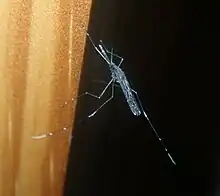
- Anopheles crypticus Coetzee 1994
- Anopheles fuscicolor Van Someren 1947
- Anopheles namibiensis Coetzee 1984
- Anopheles paludis Theobald 1900
- Anopheles symesi Edwards 1928
- Anopheles tenebrosus Donitz 1902
- Anopheles ziemanni Grunberg 1902
- Group Hyrcanus (Reid 1953)
- Anopheles anthropophagus Xu and Feng 1975
- Anopheles argyropus Swellengrebel 1914
- Anopheles belenrae Rueda 2005
- Anopheles changfus Ma 1981
- Anopheles chodukini Martini 1929
- Anopheles dazhaius Ma 1981
- Anopheles engarensis Kanda & Oguma 1978
- Anopheles hailarensis Xu JinJiang & Luo XinFu 1998
- Anopheles heiheensis Ma 1981
- Anopheles hyrcanus* Pallas 1771
- Group Hyrcanus (Reid 1953)
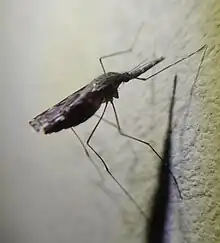
- Anopheles junlianensis Lei 1996
- Anopheles kiangsuensis Xu and Feng 1975
- Anopheles kleini Rueda 2005
- Anopheles kummingensis Dong & Wang 1985
- Anopheles kweiyangensis Yao & Wu 1944
- Anopheles liangshanensis Kang Tan Cao Cheng Yang & Huang 1984
- Anopheles nimpe Nguyen, Tran & Harbach
- Anopheles pseudopictus Graham 1899
- Anopheles pullus Yamada 1937
- Anopheles sinensis* Wiedemann 1828
- Anopheles sineroides Yamada 1924
- Anopheles xiaokuanus Ma 1981
- Anopheles xui Dong, Zhou, Dong & Mao 2007
- Anopheles yatsushiroensis Miyazaki 1951
- Subgroup Lesteri (Harrison 1972)
- Anopheles crawfordi Reid 1953
- Anopheles kiangsuensis Xu & Feng 1975
- Anopheles lesteri de Meillon 1931
- Anopheles paraliae Sandosham 1959
- Anopheles peditaeniatus Leicester 1908
- Anopheles vietnamensis Manh Hinh & Vien 1993
- Subgroup Lesteri (Harrison 1972)
- Subgroup Nigerrimus (Harrison 1972)
- Anopheles nigerrimus* Giles 1900
- Anopheles nitidus Harrison, Scanlon & Reid 1973
- Anopheles pseudosinensis Baisas 1935
- Anopheles pursati Laveran 1902
- Subgroup Nigerrimus (Harrison 1972)
- Group Umbrosus (Reid 1950)
- Anopheles brevipalpis Roper 1914
- Anopheles brevirostris Reid 1950
- Anopheles hunteri Strickland 1916
- Anopheles samarensis Rozeboom 1951
- Anopheles similissimus Strickland & Chowdhury 1927
- Group Umbrosus (Reid 1950)
- Subgroup Baezai (Rattanarithikul et al. 2004)
- Anopheles baezai Gater 1934
- Subgroup Baezai (Rattanarithikul et al. 2004)
- Subgroup Letifer (Reid 1968)
- Anopheles collessi Reid 1963
- Anopheles letifer* Sandosham 1944
- Anopheles roperi Reid 1950
- Anopheles whartoni Reid 1963
- Subgroup Letifer (Reid 1968)
- Subgroup Separatus (Rattanarithikul et al. 2004)
- Anopheles separatus Leicester 1908
- Subgroup Separatus (Rattanarithikul et al. 2004)
- Subgroup Umbrosus (Rattanarithikul et al. 2004)
- Anopheles umbrosus Theobald 1903
- Subgroup Umbrosus (Rattanarithikul et al. 2004)
Subgenus Baimaia
- Anopheles kyondawensisAbraham 1947[10]
Subgenus Cellia
Anopheles rageaui Mattingly and Adam
Series Cellia (Christophers 1924)
- Anopheles argenteolobatus Gough 1910
- Anopheles brumpti Hamon & Rickenbach 1955
- Anopheles carnevalei Brunhes le Goff & Geoffroy 1999
- Anopheles cristipalpis Service 1977
- Anopheles murphyi Gillies 1968[15]
- Anopheles pharoensis Theobald 1901[1]
- Anopheles swahilicus Gillies 1964
- Group Squamosus (Grjebine 1966)
- Anopheles cydippis de Meillon 1931
- Anopheles squamosusTheobald 1901[1]
Series Myzomyia
- Anopheles apoci Marsh 1933
- Anopheles azaniae Bailly-Choumara 1960
- Anopheles barberellus Evans 1932
- Anopheles brunnipes Theobald 1910
- Anopheles domicola Edwards 1916
- Anopheles dthali Patton 1905
- Anopheles erythraeus Corradetti 1939
- Anopheles ethiopicus Gillies & Coetzee 1987
- Anopheles flavicosta Edwards 1911
- Anopheles fontinalis Gillies 1968[15]
- Anopheles majidi Young & Majid 1928
- Anopheles moucheti* Evans 1925
- subspecies bervoetsi D'Haenans 1961
- subspecies moucheti Evans 1925
- subspecies nigeriensis
- Anopheles schwetzi Evans 1934
- Anopheles tchekedii de Meillon & Leeson 1940
- Anopheles walravensi Edwards 1930
- Group Demeilloni (Gillies & De Meillon 1962)
- Anopheles carteri Evans & de Meillon 1933
- Anopheles demeilloni Evans 1933
- Anopheles freetownensis Evans 1925
- Anopheles garnhami Edwards 1930
- Anopheles keniensis Evans 1931
- Anopheles lloreti Gil Collado 1936
- Anopheles sergentii* Theobald 1907
- subspecies macmahoni Evans 1936
- subspecies sergentii Theobald 1907
- Group Funestus (Garros et al 2004)
- Anopheles jeyporiensis James 1902
- Subgroup Aconitus (Chen et al. 2003)
- Anopheles aconitus Dönitz 1902
- Anopheles filipinae Manalang 1930
- Anopheles mangyanus Banks 1906
- Anopheles pampanai Buttiker & Beales 1959
- Anopheles varuna Iyengar 1924
- Subgroup Aconitus (Chen et al. 2003)
- Subgroup Culicifacies (Garros et al. 2004)
- Anopheles culicifacies* Giles 1901
- Subgroup Culicifacies (Garros et al. 2004)
- Subgroup Funestus (Garros et al. 2004)
- Anopheles aruni Sobti 1968
- Anopheles confusus Evans & Leeson 1935
- Anopheles funestus* Giles 1900
- Anopheles funestus-like* Spillings et al 2009[22]
- Anopheles longipalpis Type C Koekemoer et al. 2009
- Anopheles parensis Gillies 1962
- Anopheles vaneedeni Gillies & Coetzee 1987
- Subgroup Funestus (Garros et al. 2004)
- Subgroup Minimus (Chen et al. 2003)
- Anopheles flavirostris* Ludlow 1914
- Anopheles leesoni Evans 1931
- Anopheles longipalpis Type A Koekemoer et al 2009
- Subgroup Minimus (Chen et al. 2003)
- Complex Fluviatilis (Salara et al. 1993)
- Anopheles fluviatilis* (species S, T, U, V) James 1902[23]
- Complex Fluviatilis (Salara et al. 1993)
- Complex Minimus (Green et al. 1990)
- Anopheles harrisoni Harbach & Manguin 2007
- Anopheles minimusTheobald 1901[1]
- Complex Minimus (Green et al. 1990)
- Subgroup Rivulorum (Garros et al 2004)
- Anopheles brucei Service 1960
- Anopheles fuscivenosus Leeson 1930
- Anopheles rivulorum* Leeson 1935
- Subgroup Rivulorum (Garros et al 2004)
- Group Marshallii[15]
- Anopheles austenii Theobald 1905
- Anopheles berghei Vincke & Leleup 1949
- Anopheles brohieri Edwards 1929
- Anopheles gibbinsi Evans 1935
- Anopheles hancocki Edwards 1929
- Anopheles hargreavesi Evans 1927
- Anopheles harperi Evans 1936
- Anopheles mortiauxi Edwards 1938
- Anopheles mousinhoi de Meillon & Pereira 1940
- Anopheles njombiensis Peters 1955
- Anopheles seydeli Edwards 1929
- Complex Marshalli (Gillies & Coetzee 1987)
- Anopheles hughi Lambert & Coetzee 1982
- Anopheles kosiensis Coetzee, Segerman & Hunt 1987
- Anopheles letabensis Lambert & Coetzee 1982
- Anopheles marshallii Theobald 1903
- Complex Marshalli (Gillies & Coetzee 1987)
- Group Wellcomei[15]
- Anopheles distinctus Newstead & Carter 1911
- Anopheles erepens Gillies 1958
- Anopheles theileri Edwards 1912
- Anopheles wellcomei Theobald 1904
- subspecies ugandae Evans 1934
- subspecies ungujae White 1975
- subspecies wellcomei Theobald 1904
Series Neocellia (Christophers 1924)
- Anopheles ainshamsi Gad, Harbach & Harrison 2006
- Anopheles dancalicus Corradetti 1939
- Anopheles hervyi Brunhes, le Goff & Geoffroy 1999
- Anopheles jamesiiTheobald 1901[1]
- Anopheles karwari* James 1903
- Anopheles maculipalpis Giles 1902
- Anopheles moghulensis Christophers 1924
- Anopheles paltrinierii Shidrawi & Gillies 1988
- Anopheles pattoni Christophers 1926
- Anopheles pretoriensis Theobald 1903
- Anopheles pulcherrimusTheobald 1902*[11]
- Anopheles rufipes Gough 1910
- subspecies broussesi Edwards 1929
- subspecies rufipes Gough 1910
- Anopheles salbaii Maffi & Coluzzi 1958
- Anopheles splendidus Koidzumi 1920
- Anopheles theobaldi Giles 1901
- Complex Stephensi
- Anopheles stephensi* Liston 1901
- Complex Superpictus
- Anopheles superpictus* Grassi 1899
- Group Annularis (Reid 1968)
- Anopheles pallidus Theobald 1901[1]
- Anopheles philippinensis* Ludlow 1902
- Anopheles schueffneri Stanton 1915
- Complex Annularis (Reid 1968)
- Anopheles annularis* van der Wulp 1884
- Complex Annularis (Reid 1968)
- Complex Nivipes (Green et al. 1985)
- Anopheles nivipes Theobald 1903
- Complex Nivipes (Green et al. 1985)
- Group Jamesii (Rattanarithikul et al. 2004)
- Anopheles jamesii Theobald 1901[1]
- Anopheles pseudojamesi Strickland & Chowdhury 1927
- Anopheles splendidus Koidzumi 1920
- Group Maculatus (Rattanarithikul & Green 1987)
- Anopheles dispar Rattanarithikul & Harbach 1991
- Anopheles greeni Rattanarithikul & Harbach 1991
- Anopheles pseudowillmori Theobald 1910
- Anopheles rampae
- Anopheles willmori James 1903
- Subgroup Maculatus (Rattanarithikul et al 2004)
- Anopheles dravidicus Christophers 1924
- Anopheles maculatus*[1]
- Subgroup Maculatus (Rattanarithikul et al 2004)
- Subgroup Sawadwongporni (Rattanarithikul et al 2004)
- Anopheles notanandai Rattanarithikul & Green 1987
- Anopheles sawadwongporni Rattanarithikul & Green 1987
- Subgroup Sawadwongporni (Rattanarithikul et al 2004)
Series Neomyzomyia (Christophers 1924)
- Anopheles amictus Edwards 1921
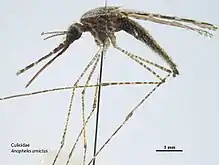
- Anopheles annulatus Haga 1930
- Anopheles aurirostris Watson 1910
- Anopheles dualaensis Brunhes le Goff & Geoffroy 1999
- Anopheles hilli Woodhill & Lee 1944
- Anopheles incognitus Brug 1931
- Anopheles kochi Dönitz 1901
- Anopheles kokhani Vythilingam, Jeffery & Harbach 2007
- Anopheles kolambuganensis Baisas 1932
- Anopheles longirostris Brug 1928
- Anopheles mascarensis de Meillon 1947
- Anopheles meraukensis Venhuis 1932
- Anopheles novaguinensis Venhuis 1933
- Anopheles saungi Colless 1955
- Anopheles stookesi Colless 1955
- Anopheles watsonii Leicester 1908
- Complex Annulipes
- Anopheles annulipes Walker 1856
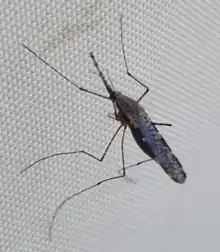
- Complex Lungae
- Anopheles lungae Belkin & Schlosser 1944
- Anopheles nataliae Belkin 1945
- Anopheles solomonis Belkin, Knight & Rozeboom 1945
- Complex Punctulatus
- Anopheles clowi Rozeboom & Knight 1946
- Anopheles farauti* Laveran 1902
- Anopheles hinesorum Schmidt 2001
- Anopheles irenicus Schmidt 2003
- Anopheles koliensis Owen 1945
- Anopheles punctulatus Dönitz 1901
- Hosts: Bos taurus, Canis familiaris, Equus, Felis, Gallus[24]
- Anopheles torresiensis Schmidt 2001
- Group Ardensis[15]
- Anopheles ardensis Theobald 1905
- Anopheles buxtoni Service 1958
- Anopheles cinctus Newstead & Carter 1910
- Anopheles deemingi Service 1970
- Anopheles eouzani Brunhes le Goff & Bousses 2003
- Anopheles kingi Christophers 1923
- Anopheles machardyi Edwards 1930
- Anopheles maliensis Bailly-Choumara & Adam 1959
- Anopheles millecampsi Lips 1960
- Anopheles multicinctus Edwards 1930
- Anopheles natalensis Hill & Haydon 1907
- Anopheles vernus Gillies 1968[15]
- Anopheles vinckei de Meillon 1942
- Complex Nili[15]
- Anopheles carnevalei Brunhes, le Geoff & Geoffrey 1999
- Anopheles nili* Theobald 1904
- Anopheles ovengensis Awono-Ambene Simard Antonio-Nkonkjio & Fontenille 2004
- Anopheles somalicus Rivola & Holstein 1957
- Complex Nili[15]
- Group Kochi (Rattanarithikul et al 2004)
- Anopheles kochi Donitz 1901
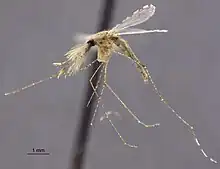
- Group Leucosphyrus
- Anopheles baisasi Colless 1957
- Anopheles cristatus King & Baisas
- Subgroup Elegans
- Anopheles elegans James 1903
- Subgroup Elegans
- Subgroup Hackeri
- Anopheles hackeri Edwards 1921
- Anopheles mirans Sallum & Peyton 2005
- Anopheles pujutensis Colless 1948
- Anopheles recens Sallum & Peyton 2005
- Anopheles sulawesi* Waktoedi 1954
- Subgroup Hackeri
- Subgroup Leucosphyrus
- Anopheles baimaii* Sallum & Peyton 2005
- Anopheles cracens Sallum & Peyton 2005
- Anopheles scanloni Sallum & Peyton 2005
- Subgroup Leucosphyrus
- Complex Dirus
- Anopheles dirus* Peyton & Harrison 1979
- Anopheles nemophilous Peyton & Ramalingam 1988
- Anopheles takasagoensis Morishita 1946
- Complex Dirus
- Complex Leucosphyrus (Peyton 1990)
- Anopheles balabacensis* Baisas 1936
- Anopheles introlatus Colless 1957
- Anopheles latens* Sallum & Peyton 2005
- Anopheles leucosphyrus* Dönitz 1901
- Complex Leucosphyrus (Peyton 1990)
- Subgroup Riparis (Peyton 1990)
- Anopheles cristatus King & Baisas
- Anopheles macarthuri Colless 1956
- Anopheles riparis King & Baisas 1936
- Subgroup Riparis (Peyton 1990)
- Group Tessellatus (Rattanarithikul et al 2004)
- Anopheles tessellatus Theobald
- subspecies A. t. kalawara Stoker & Waktoedi
- subspecies A. t. orientalis Swellengrebel & Swellengrebel de Graaf
- subspecies A. t. tessellatus Theobald
- Anopheles tessellatus Theobald
Series Paramyzomyia (Christophers & Barraud 1931)
- Group Cinereus[15]
- Complex Turkhudi (Liston)
- Anopheles turkhudi Liston 1901
- subspecies telamali Saliternik & Theodor 1942
- subspecies turkhudi Liston 1901
- Anopheles turkhudi Liston 1901
- Complex Turkhudi (Liston)
- Group Listeri[15]
- Anopheles listeri de Mellion 1931
- Anopheles multicolor* Cambouliu 1902
- Anopheles seretsei Abdulla-Chan Coetzee & Hunt 1998
Series Pyretophorus (Blanchard 1902)
- Anopheles christyi Newstead & Carter 1911
- Anopheles daudi Coluzzi 1958
- Anopheles indefinitus Ludlow 1904
- Anopheles limosus King 1932
- Anopheles litoralis King 1932
- Anopheles ludlowae Theobald 1903
- subspecies ludlowae Theobald 1903
- subspecies torakala Stoker & Waktoedi 1949
- Anopheles parangensis Ludlow 1914
- Anopheles vagus* Dönitz 1902
- Complex Gambiae (White 1985)
- Anopheles amharicus Hunt, Wilkerson & Coetzee 2013
- Anopheles arabiensis* Patton 1905
- Anopheles bwambae White 1985
- Anopheles coluzzii* Coetzee & Wilkerson 2013 [25]
- Anopheles comorensis Brunhes le Goff & Geoffroy 1997
- Anopheles fontenillei Barrón et al 2019
- Anopheles gambiae* Giles 1902
- Anopheles melas* Theobald 1903
- Anopheles merus Dontiz 1902
- Anopheles quadriannulatus Theobald 1911
- Complex Subpictus (Sugana et al. 1994)
- Anopheles subpictus* Grassi 1899
- Complex Sundaicus (Sukowati 1999)
- Anopheles epiroticus Linton & Harbach 2005
- Anopheles sundaicus* Rodenwaldt 1925
Subgenus Kerteszia
- Anopheles auyantepuiensis Harbach & Navarro 1996
- Anopheles bambusicolus Komp 1937
- Anopheles bellator* Dyar & Knab 1906
- Anopheles boliviensis Theobald 1905
- Anopheles cruzii* Dyar & Knab 1908
- Anopheles gonzalezrinconesi Cova Garcia, Pulido & de Ugueto, 1977
- Anopheles homunculus* Komp 1937
- Anopheles laneanus Corrêa & Cerqueira 1944
- Anopheles lepidotus Zavortink 1973
- Anopheles neivai Howard, Dyar & Knab 1913
- Anopheles pholidotus Zavortink 1973
- Anopheles rollai Cova Garcia, Pulido & de Ugueto 1977
Note: Anopheles cruzii is known to be a species complex,[26] but the number species in this complex has yet to be finalised.
Subgenus Lophopodomyia
- Anopheles gilesi Peryassu 1928
- Anopheles gomezdelatorrei Levi-Castillo 1955
- Anopheles oiketorakras Osorno-Mesa 1947
- Anopheles pseudotibiamaculata Galvao & Barretto 1941
- Anopheles squamifemur Antunes 1937
- Anopheles vargasi Gabaldon Cova Garcia & Lopez 1941
Subgenus Nyssorhynchus
- Anopheles dominicanus Zavortinkb and Poinarab 2000
- Section Albimanus
- Anopheles noroestensis Galvao and Lane 1937
- Series Albimanus (Faran 1980)
- Anopheles albimanus* Weidemann 1820
- Series Albimanus (Faran 1980)
- Series Oswaldoi (Faran 1980)
- Group Oswaldoi (Faran 1980)
- Subgroup Oswaldoi (Faran 1980)
- Anopheles anomalphyllus Komp
- Anopheles aquasalis* Curry 1932
- Anopheles dunhamii Causey 1945
- Anopheles evansae Brethes 1926
- Anopheles galvaoi Causey, Deane and Deane 1943
- Anopheles ininii Sevenet & Abonnenc 1938
- Anopheles konderi Galvfio & Damasceno 1942
- Anopheles oswaldoi Peryassú 1922
- Anopheles rangeli Galabadon, Cova-Garcia & Lopez 1941
- Anopheles sanctielii Sevenet & Abonnenc 1938
- Anopheles trinkae Faran 1980
- Subgroup Oswaldoi (Faran 1980)
- Complex Nuneztovari (Conn et al. 1993)
- Anopheles geoeldii Rozeboom and Gabaldón 1941
- Anopheles nuneztovari* Galbadón 1940
- Complex Nuneztovari (Conn et al. 1993)
- Subgroup Strodei (Faran 1980)
- Anopheles alberto
- Anopheles arthuri*
- Anopheles benarrochi Galabadon, Cova-Garcia & Lopez
- Anopheles rondoni Neiva & Pinto 1922
- Anopheles strodei Root 1926
- Subgroup Strodei (Faran 1980)
- Group Triannulatus
- Anopheles halophylus do Nascimento & de Oliveira 2002
- Anopheles triannulatus Neiva & Pinto 1922
- Group Triannulatus
- Section Argyritarsis (Levi Castillo 1949)
- Series Albitarsis[27]
- Anopheles rooti Brethes 1926
- Series Albitarsis[27]
- Group Braziliensis[27]
- Anopheles braziliensis Chagas 1907
- Group Braziliensis[27]
- Series Argyritarsis[27]
- Group Argyritarsis[27]
- Anopheles argyitarsis Robineau-Desvoidy 1827
- Anopheles sawyeri Causey, Deane, Deane & Sampaio 1943
- Group Argyritarsis[27]
- Group Darlingi[27]
- Anopheles darlingi* Root
- Group Darlingi[27]
- Group Lanie[27]
- Anopheles lanei Galvao & Amaral 1938
- Group Lanie[27]
- Group Pictipennis[27]
- Anopheles pictipennis Phillippi 1865
- Section Myzorhynchella (Peyton et al. 1992)
- Anopheles antunesi Galvao & Amaral 1940
- Anopheles lutzii Cruz 1901
- Anopheles nigritarsis Chagas 1907
- Anopheles parvus Chagas 1907
Subgenus Stethomyia
- Anopheles acanthotorynus Komp 1937
- Anopheles canorii Floch & Abonnenc 1945
- Anopheles kompi Edwards 1930
- Anopheles nimbus[11]
- Anopheles thomasi Shannon 1933
Notes
- Anopheles anthropophagus Xu and Feng is considered to be a junior synonym of Anopheles lesteri de Meillon 1931.
- Anopheles bonneorum Fonseca & Ramos is considered to be a synonym of Anopheles costai.
- Anopheles lewisi Ludlow 1920 is a synonym of Anopheles thomasi Shannon 1933.
- Anopheles lineata Lutz is a synonym of Anopheles nimbus Theobald.
- Anopheles mesopotamiae is considered to be a synonym of Anopheles hyrcanus.
- Anopheles rossii Giles 1899 was originally described as Anopheles subpictus Grassi 1899.
- Bironella derooki is a synonym of Anopheles soesiloi.
The following are currently regarded as nomina nuda:
- Anopheles (Anopheles) solomonensis Cumpston 1924
- Anopheles (Cellia) melanotarsis Woodhill & Lee
A subgroup of Anopheles gambiae sensu stricto has been reported and given the name Goundry. This subgroup has not yet been elevated to species status.[28]
References
- Theobald, Frederick Vincent (1901). A Monograph of the Culicidae, or Mosquitoes. Vol. 1. London: British Museum (Natural History). ISBN 978-1178519037.
- Krzywinski, Jaroslaw; Besansky, Nora J (2003). "MOLECULARSYSTEMATICS OFANOPHELES: From Subgenera to Subpopulations". Annual Review of Entomology. 48: 111–39. doi:10.1146/annurev.ento.48.091801.112647. PMID 12208816.
- Foley, Desmond H; Bryan, Joan H; Yeates, David; Saul, Allan (1998). "Evolution and Systematics of Anopheles:Insights from a Molecular Phylogeny of Australasian Mosquitoes". Molecular Phylogenetics and Evolution. 9 (2): 262–75. doi:10.1006/mpev.1997.0457. PMID 9562985.
- Calle, D. A; Quiñones, M. L; Erazo, H. F; Jaramillo, N (2008). "Discriminación por morfometría geométrica de once especies de Anopheles (Nyssorhynchus) presentes en Colombia" [Differentiation by geometric morphometrics among 11 Anopheles (Nyssorhynchus) in Colombia]. Biomedica: Revista del Instituto Nacional de Salud (in Portuguese). 28 (3): 371–85. PMID 19034360.
- Rattanarithikul, R; Harrison, B. A; Harbach, R. E; Panthusiri, P; Coleman, R. E; Panthusiri, P (2006). "Illustrated keys to the mosquitoes of Thailand. IV. Anopheles". The Southeast Asian Journal of Tropical Medicine and Public Health. 37 Suppl 2: 1–128. PMID 17262930.
- Sedaghat, M. M; Harbach, R. E (2005). "An annotated checklist of the Anopheles mosquitoes (Diptera: Culicidae) in Iran". Journal of Vector Ecology. 30 (2): 272–6. PMID 16599162.
- Walton, C; Somboon, P; o'Loughlin, S.M; Zhang, S; Harbach, R.E; Linton, Y.-M; Chen, B; Nolan, K; Duong, S; Fong, M.-Y; Vythilingum, I; Mohammed, Z.D; Trung, Ho Dinh; Butlin, R.K (2007). "Genetic diversity and molecular identification of mosquito species in the Anopheles maculatus group using the ITS2 region of rDNA". Infection, Genetics and Evolution. 7 (1): 93–102. doi:10.1016/j.meegid.2006.05.001. PMID 16782411.
- Garros, C; Harbach, R. E; Manguin, S (2005). "Morphological assessment and molecular phylogenetics of the Funestus and Minimus groups of Anopheles (Cellia)". Journal of Medical Entomology. 42 (4): 522–36. doi:10.1603/0022-2585(2005)042[0522:maampo]2.0.co;2. PMID 16119539. S2CID 22776177.
- Meigen, J.W. (1818). Systematische Beschreibung der bekannten europäischen zweiflügeligen Insekten [Systematic description of the known European two-winged insects] (in German). Aachen. OCLC 13208765.
- Abraham, O. K. (1947). "Anopheles kyondawensis n. sp. from Lower Burma". Medical Journal of Malaya. 1947 (1): 173–176.
- Theobald, Frederick Vincent (1902). "The Classification of the Anophelina" (PDF). Journal of Tropical Medicine. 5: 181–183. Retrieved 13 September 2015.
- Harbach, Ralph E; Kitching, Ian J (2005). "Reconsideration of anopheline mosquito phylogeny (Diptera: Culicidae: Anophelinae) based on morphological data". Systematics and Biodiversity. 3 (4): 345–74. doi:10.1017/S147720000500174X. S2CID 84208117.
- Moreno, Marta; Marinotti, Osvaldo; Krzywinski, Jaroslaw; Tadei, Wanderli P; James, Anthony A; Achee, Nicole L; Conn, Jan E (2010). "Complete mtDNA genomes of Anopheles darlingi and an approach to anopheline divergence time". Malaria Journal. 9: 127. doi:10.1186/1475-2875-9-127. PMC 2877063. PMID 20470395.
- Calvo, Eric; Pham, Van M; Marinotti, Osvaldo; Andersen, John F; Ribeiro, Jose MC (2009). "The salivary gland transcriptome of the neotropical malaria vector Anopheles darlingi reveals accelerated evolution of genes relevant to hematophagy". BMC Genomics. 10: 57. doi:10.1186/1471-2164-10-57. PMC 2644710. PMID 19178717.
- Gillies, M. T.; De Meillon, Botha (1968). The Anophelinae of Africa south of the Sahara (Ethiopian zoogeographical region) (2 ed.). Johannesburg: South African Institute for Medical Research. OCLC 9614034.
- Scarpassa, Vera Margarete; Conn, Jan E (2011). "Mitochondrial DNA Detects a Complex Evolutionary History with Pleistocene Epoch Divergence for the Neotropical Malaria Vector Anopheles nuneztovari Sensu Lato". The American Journal of Tropical Medicine and Hygiene. 85 (5): 857–67. doi:10.4269/ajtmh.2011.11-0150. PMC 3205631. PMID 22049039.
- De Souza, Dziedzom K; Koudou, Benjamin G; Bolay, Fatorma K; Boakye, Daniel A; Bockarie, Moses J (2013). "Filling the Gap 115 Years after Ronald Ross: The Distribution of the Anopheles coluzzii and Anopheles gambiae s.s from Freetown and Monrovia, West Africa". PLOS ONE. 8 (5): e64939. Bibcode:2013PLoSO...864939D. doi:10.1371/journal.pone.0064939. PMC 3669227. PMID 23741429.
- Kamali, Maryam; Xia, Ai; Tu, Zhijian; Sharakhov, Igor V (2012). "A New Chromosomal Phylogeny Supports the Repeated Origin of Vectorial Capacity in Malaria Mosquitoes of the Anopheles gambiae Complex". PLOS Pathogens. 8 (10): e1002960. doi:10.1371/journal.ppat.1002960. PMC 3464210. PMID 23055932.
- Hua, Ya-Qiong; Ding, Yi-Ran; Yan, Zhen-Tian; Si, Feng-Ling; Luo, Qian-Chun; Chen, Bin (2016). "The complete mitochondrial genome of Anopheles minimus (Diptera: Culicidae) and the phylogenetics of known Anopheles mitogenomes". Insect Science. 23 (3): 353–65. doi:10.1111/1744-7917.12326. PMID 26852698. S2CID 25879811.
- Bonne-Wepster, J. (1951). "Anopheles venhuisi n. sp. [sic]". Documenta Neerlandica et Indonesica de Morbis Tropicis. 3: 24.
- Senevet, G.; Prunnelle, M. (1927). "Une nouvelle espèce d'anophèle en Algérie, Anopheles marteri n. sp" [A new species of anopheles in Algeria, Anopheles marteri n. sp]. Archives de l'Institut Pasteur d'Algérie (in French). 5 (4): 529–533.
- Spillings BL, Brooke BD, Koekemoer LL, Chiphwanya J, Coetzee M, Hunt RH (2009) A new species concealed by Anopheles funestus Giles, a major malaria vector in Africa. Am J Trop Med Hyg 81(3):510-5
- Nanda, Nutan; Singh, Om P; Dua, Virendra K; Pandey, Akhilesh C; Nagpal, Bhupender N; Adak, Tridibes; Dash, Aditya P; Subbarao, Sarala K (2013). "Population cytogenetic and molecular evidence for existence of a new species in Anopheles fluviatilis complex (Diptera: Culicidae)". Infection, Genetics and Evolution. 13: 218–23. doi:10.1016/j.meegid.2012.09.018. PMID 23146830.
- "Anopheles punctulatus". Invasive Species Compendium (ISC). CABI (Centre for Agriculture and Bioscience International). 2019-11-20. Retrieved 2022-01-09.
- Coetzee, M.; Hunt, R. H.; Wilkerson, R.; Della Torre, A.; Coulibaly, M. B.; Besansky, N. J. (2013). "Anopheles coluzzii and Anopheles amharicus, new members of the Anopheles gambiae complex". Zootaxa. 3619 (3): 246–74. doi:10.11646/zootaxa.3619.3.2. PMID 26131476.
- Rona LD, Carvalho-Pinto CJ, Peixoto AA (2010) Molecular evidence for the occurrence of a new sibling species within the Anopheles (Kerteszia) cruzii complex in south-east Brazil. Malar J 26, 9(1):33
- Linthicum, Kenneth J. (1988). "A revision of Argyritarsis section of the subgenus Nyssorhynchus of Anopheles" (PDF). Mosquito Systematics. 20 (2): 98–271. Retrieved 13 September 2015.
- Riehle, M. M; Guelbeogo, W. M; Gneme, A; Eiglmeier, K; Holm, I; Bischoff, E; Garnier, T; Snyder, G. M; Li, X; Markianos, K; Sagnon, N; Vernick, K. D (2011). "A Cryptic Subgroup of Anopheles gambiae is Highly Susceptible to Human Malaria Parasites". Science. 331 (6017): 596–8. Bibcode:2011Sci...331..596R. doi:10.1126/science.1196759. PMC 3065189. PMID 21292978.